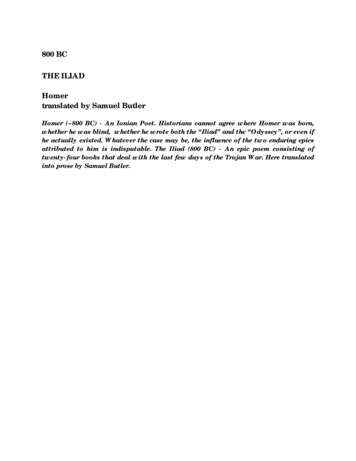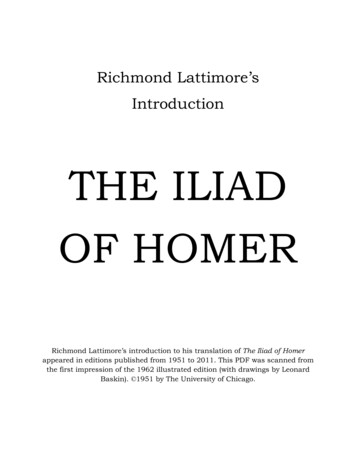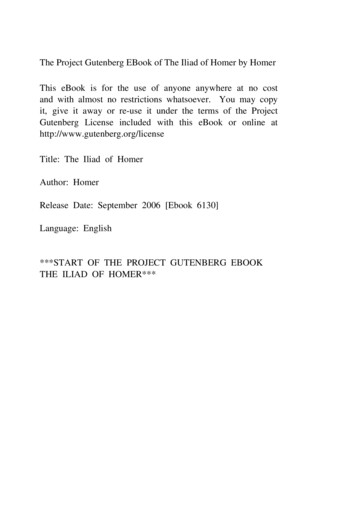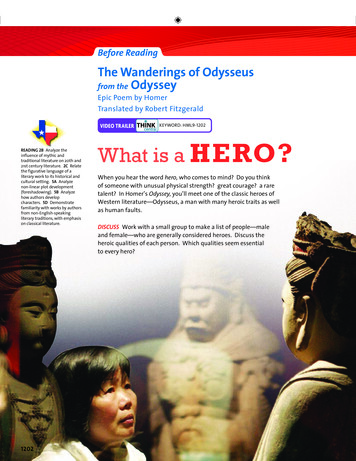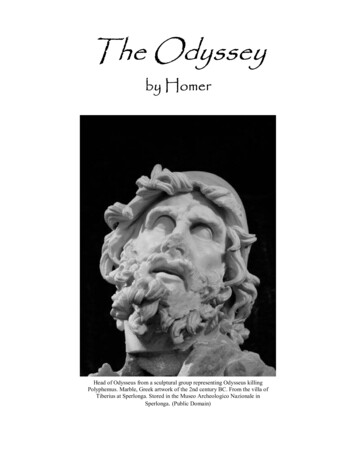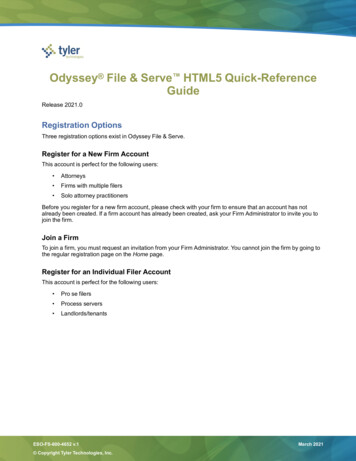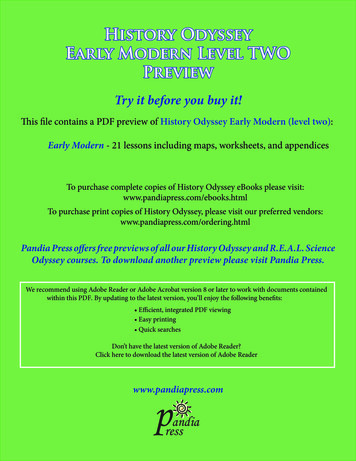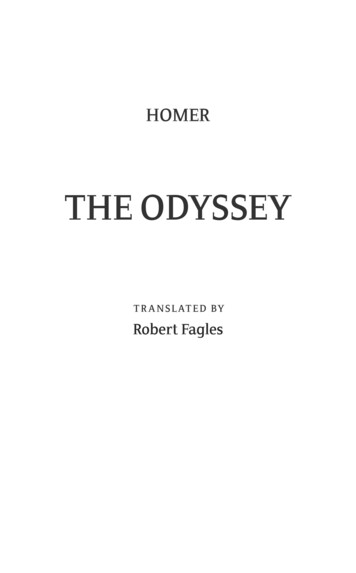
Transcription
HOMERTHE ODYSSEYT R A N S L AT E D BYRobert Fagles
Book IAthena Inspiresthe PrinceSing to me of the man, Muse, the man of twists and turns driven time and again off course, once he had plunderedthe hallowed heights of Troy.Many cities of men he saw and learned their minds,many pains he suffered, heartsick on the open sea,fighting to save his life and bring his comrades home.But he could not save them from disaster, hard as he strove—the recklessness of their own ways destroyed them all,the blind fools, they devoured the cattle of the Sunand the Sungod blotted out the day of their return.Launch out on his story, Muse, daughter of Zeus,start from where you will—sing for our time too.By now,all the survivors, all who avoided headlong deathwere safe at home, escaped the wars and waves.
But one man alone his heart set on his wife and his return—Calypso,the bewitching nymph, the lustrous goddess, held him back,deep in her arching caverns, craving him for a husband.But then, when the wheeling seasons brought the year around,that year spun out by the gods when he should reach his home,Ithaca—though not even there would he be free of trials,even among his loved ones—then every god took pity,all except Poseidon. He raged on, seething againstthe great Odysseus till he reached his native land.But nowPoseidon had gone to visit the Ethiopians worlds away,Ethiopians off at the farthest limits of mankind,a people split in two, one part where the Sungod setsand part where the Sungod rises. There Poseidon wentto receive an offering, bulls and rams by the hundred—far away at the feast the Sea-lord sat and took his pleasure.But the other gods, at home in Olympian Zeus’s halls,met for full assembly there, and among them nowthe father of men and gods was first to speak,sorely troubled, remembering handsome Aegisthus,the man Agamemnon’s son, renowned Orestes, killed.Recalling Aegisthus, Zeus harangued the immortal powers:“Ah how shameless—the way these mortals blame the gods.From us alone, they say, come all their miseries, yes,but they themselves, with their own reckless ways,compound their pains beyond their proper share.Look at Aegisthus now above and beyond his share he stole Atrides’ wife,he murdered the warlord coming home from Troythough he knew it meant his own total ruin.Far in advance we told him so ourselves,dispatching the guide, the giant-killer Hermes.‘Don’t murder the man,’ he said, ‘don’t court his wife.Beware, revenge will come from Orestes, Agamemnon’s son,that day he comes of age and longs for his native land.’So Hermes warned, with all the good will in the world,
but would Aegisthus’ hardened heart give way?Now he pays the price—all at a single stroke.”And sparkling-eyed Athena drove the matter home:“Father, son of Cronus, our high and mighty king,surely he goes down to a death he earned in full!Let them all die so, all who do such things.But my heart breaks for Odysseus,that seasoned veteran cursed by fate so long—far from his loved ones still, he suffers tormentsoff on a wave-washed island rising at the center of the seas.A dark wooded island, and there a goddess makes her home,daughter of Atlas, wicked Titan who sounds the deepin all its depths, whose shoulders lift on highthe colossal pillars thrusting earth and sky apart.Atlas’ daughter it is who holds Odysseus captive,luckless man—despite his tears, forever tryingto spellbind his heart with suave, seductive wordsand wipe all thought of Ithaca from his mind.But he, straining for no more than a glimpseof hearth-smoke drifting up from his own land,Odysseus longs to die Olympian Zeus,have you no care for him in your lofty heart?Did he never win your favor with sacrificesburned beside the ships on the broad plain of Troy?Why, Zeus, why so dead set against Odysseus?”“My child,” Zeus who marshals the thunderheads replied,“what nonsense you let slip through your teeth. Now,how on earth could I forget Odysseus? Great Odysseuswho excels all men in wisdom, excels in offerings toohe gives the immortal gods who rule the vaulting skies?No, it’s the Earth-Shaker, Poseidon, unappeased,forever fuming against him for the Cyclopswhose giant eye he blinded: godlike Polyphemus,towering over all the Cyclops’ clans in power.
The nymph Thoosa bore him, daughter of Phorcys,lord of the barren salt sea—she met Poseidononce in his vaulted caves and they made love.And now for his blinded son the earthquake god—though he won’t quite kill Odysseus—drives him far off course from native land.But come, all of us here put heads together now,work out his journey home so Odysseus can return.Lord Poseidon, I trust, will let his anger go.How can he stand his ground against the willof all the gods at once—one god alone?”Athena, her eyes flashing bright, exulted,“Father, son of Cronus, our high and mighty king!If now it really pleases the blissful godsthat wise Odysseus shall return—home at last—let us dispatch the guide and giant-killer Hermesdown to Ogygia Island, down to announce at onceto the nymph with lovely braids our fixed decree:Odysseus journeys home—the exile must return!While I myself go down to Ithaca, rouse his sonto a braver pitch, inspire his heart with courageto summon the flowing-haired Achaeans to full assembly,speak his mind to all those suitors, slaughtering on and onhis droves of sheep and shambling longhorn cattle.Next I will send him off to Sparta and sandy Pylos,there to learn of his dear father’s journey home.Perhaps he will hear some news and make his namethroughout the mortal world.”So Athena vowedand under her feet she fastened the supple sandals,ever-glowing gold, that wing her over the wavesand boundless earth with the rush of gusting winds.She seized the rugged spear tipped with a bronze point—weighted, heavy, the massive shaft she wields to break the linesof heroes the mighty Father’s daughter storms against.And down she swept from Olympus’ craggy peaksand lit on Ithaca, standing tall at Odysseus’ gates,
the threshold of his court. Gripping her bronze spear,she looked for all the world like a stranger now,like Mentes, lord of the Taphians.There she found the swaggering suitors, just thenamusing themselves with rolling dice before the doors,lounging on hides of oxen they had killed themselves.While heralds and brisk attendants bustled round them,some at the mixing-bowls, mulling wine and water,others wiping the tables down with sopping sponges,setting them out in place, still other servantsjointed and carved the great sides of meat.First by far to see her was Prince Telemachus,sitting among the suitors, heart obsessed with grief.He could almost see his magnificent father, here in the mind’s eye—if only he might drop from the cloudsand drive these suitors all in a rout throughout the hallsand regain his pride of place and rule his own domains!Daydreaming so as he sat among the suitors,he glimpsed Athena nowand straight to the porch he went, mortifiedthat a guest might still be standing at the doors.Pausing beside her there, he clasped her right handand relieving her at once of her long bronze spear,met her with winged words: “Greetings, stranger!Here in our house you’ll find a royal welcome.Have supper first, then tell us what you need.”He led the way and Pallas Athena followed.Once in the high-roofed hall, he took her lanceand fixed it firm in a burnished rack againsta sturdy pillar, there where row on row of spears,embattled Odysseus’ spears, stood stacked and waiting.Then he escorted her to a high, elaborate chair of honor,over it draped a cloth, and here he placed his guestwith a stool to rest her feet. But for himselfhe drew up a low reclining chair beside her,richly painted, clear of the press of suitors,
concerned his guest, offended by their uproar,might shrink from food in the midst of such a mob.He hoped, what’s more, to ask him about his long-lost father.A maid brought water soon in a graceful golden pitcherand over a silver basin tipped it outso they might rinse their hands,then pulled a gleaming table to their side.A staid housekeeper brought on bread to serve them,appetizers aplenty too, lavish with her bounty.A carver lifted platters of meat toward them,meats of every sort, and set beside them golden cupsand time and again a page came round and poured them wine.But now the suitors trooped in with all their swaggerand took their seats on low and high-backed chairs.Heralds poured water over their hands for rinsing,serving maids brought bread heaped high in traysand the young men brimmed the mixing-bowls with wine.They reached out for the good things that lay at hand,and when they’d put aside desire for food and drinkthe suitors set their minds on other pleasures,song and dancing, all that crowns a feast.A herald placed an ornate lyre in Phemius’ hands,the bard who always performed among them there;they forced the man to sing.A rippling prelude—and no sooner had he struck up his rousing songthan Telemachus, head close to Athena’s sparkling eyes,spoke low to his guest so no one else could hear:“Dear stranger, would you be shocked by what I say?Look at them over there. Not a care in the world,just lyres and tunes! Easy for them, all right,they feed on another’s goods and go scot-free—a man whose white bones lie strewn in the rain somewhere,rotting away on land or rolling down the ocean’s salty swells.But that man—if they caught sight of him home in Ithaca,by god, they’d all pray to be faster on their feetthan richer in bars of gold and heavy robes.
But now, no use, he’s died a wretched death.No comfort’s left for us not even ifsomeone, somewhere, says he’s coming home.The day of his return will never dawn.Enough.Tell me about yourself now, clearly, point by point.Who are you? where are you from? your city? your parents?What sort of vessel brought you? Why did the sailorsland you here in Ithaca? Who did they say they are?I hardly think you came this way on foot!And tell me this for a fact—I need to know—is this your first time here? Or are you a friend of father’s,a guest from the old days? Once, crowds of other menwould come to our house on visits—visitor that he was,when he walked among the living.”Her eyes glinting,goddess Athena answered, “My whole story, of course,I’ll tell it point by point. Wise old Anchialuswas my father. My own name is Mentes,lord of the Taphian men who love their oars.And here I’ve come, just now, with ship and crew,sailing the wine-dark sea to foreign ports of call,to Temese, out for bronze—our cargo gleaming iron.Our ship lies moored off farmlands far from town,riding in Rithron Cove, beneath Mount Nion’s woods.As for the ties between your father and myself,we’ve been friends forever, I’m proud to say,and he would bear me outif you went and questioned old lord Laertes.He, I gather, no longer ventures into townbut lives a life of hardship, all to himself,off on his farmstead with an aged serving-womanwho tends him well, who gives him food and drinkwhen weariness has taken hold of his withered limbsfrom hauling himself along his vineyard’s steep slopes.And now I’ve come—and why? I heard that he was back your father, that is. But no, the gods thwart his passage.Yet I tell you great Odysseus is not dead. He’s still alive,
somewhere in this wide world, held captive, out at seaon a wave-washed island, and hard men, savages,somehow hold him back against his will.Wait,I’ll make you a prophecy, one the immortal godshave planted in my mind—it will come true, I think,though I’m hardly a seer or know the flights of birds.He won’t be gone long from the native land he loves,not even if iron shackles bind your father down.He’s plotting a way to journey home at last;he’s never at a loss.But come, please,tell me about yourself now, point by point.You’re truly Odysseus’ son? You’ve sprung up so!Uncanny resemblance the head, and the fine eyes—I see him now. How often we used to meet in the old daysbefore he embarked for Troy, where other Argive captains,all the best men, sailed in the long curved ships.From then to this very dayI’ve not set eyes on Odysseus or he on me.”And young Telemachus cautiously replied,“I’ll try, my friend, to give you a frank answer.Mother has always told me I’m his son, it’s true,but I am not so certain. Who, on his own,has ever really known who gave him life?Would to god I’d been the son of a happy manwhom old age overtook in the midst of his possessions!Now, think of the most unlucky mortal ever born—since you ask me, yes, they say I am his son.”“Still,” the clear-eyed goddess reassured him,“trust me, the gods have not marked out your housefor such an unsung future,not if Penelope has borne a son like you.But tell me about all this and spare me nothing.What’s this banqueting, this crowd carousing here?And what part do you play yourself? Some wedding-feast,
some festival? Hardly a potluck supper, I would say.How obscenely they lounge and swagger here, look,gorging in your house. Why, any man of sensewho chanced among them would be outraged,seeing such behavior.”Ready Telemachustook her up at once: “Well, my friend,seeing you want to probe and press the question,once this house was rich, no doubt, beyond reproachwhen the man you mentioned still lived here, at home.Now the gods have reversed our fortunes with a vengeance—wiped that man from the earth like no one else before.I would never have grieved so much about his deathif he’d gone down with comrades off in Troyor died in the arms of loved ones,once he had wound down the long coil of war.Then all united Achaea would have raised his tomband he’d have won his son great fame for years to come.But now the whirlwinds have ripped him away, no fame for him!He’s lost and gone now—out of sight, out of mind—and I he’s left me tears and grief. Nor do I rack my heartand grieve for him alone. No longer. Now the godshave invented other miseries to plague me.Listen.All the nobles who rule the islands round about,Dulichion, and Same, and wooded Zacynt
Ithaca—though not even there would he be free of trials, even among his loved ones—then every god took pity, all except Poseidon. He raged on, seething against the great Odysseus till he reached his native land. But now Poseidon had gone to visit the Ethiopians worlds away, Ethiopians off at the farthest limits of mankind, a people split in two, one part where the Sungod sets and part .
